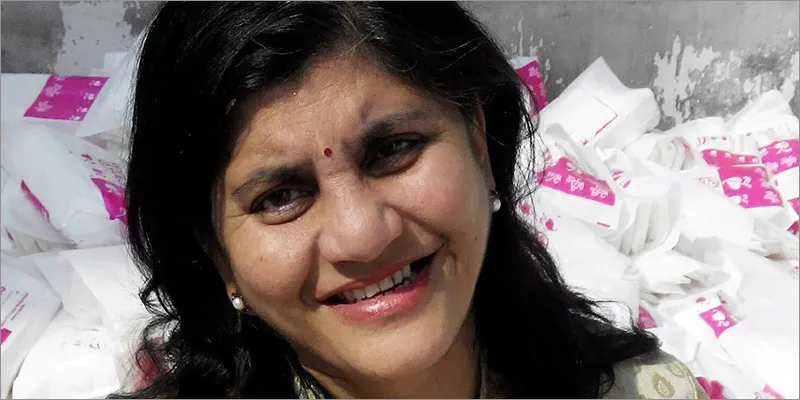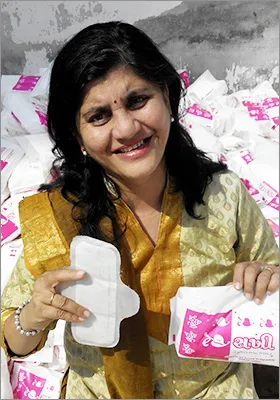Swati Bedekar works towards making menstruation hygienic for women of rural India
Is old cloth unavailable for use? Then maybe easily available soil or sand on a teak leaf can be tied around the waists as protection for those five days.
Swati Bedekar was horrified at the unhygienic living conditions of menstruating women in rural India and decided to start up. It was her desire to gift rural women a hygienic eco-system for those five days and also ensure that they get incentivised to use that option that she started a movement of sorts under her organisation, Vatsalya Foundation.

When working with rural government schools, Swati saw a huge dropout rate among students. While the boys opted out to help their fathers on the farmland or do odd jobs and become an earning family member, for adolescent girls, it was menstruation that played villain. And the worst part was that counselling mothers did not help much.
Around menstruation there are so many things – ignorance, indifference and injustice that it irked me, I thought the need was to do something that addresses all these issues together,
says Swati.
This champion of women’s rights was stumped by the common response from mothers of adolescent girls – ‘hamare sharir ki saari kharaabi bahar nikal ke aa jaati hai is dauran’ (all the dirt in our bodies comes out during this period). ‘There is something inauspicious about us’, ‘we are at fault’, ‘this is something given to us by God which we must endure’ etc were the other common responses that Swati got.
There was simply no urge for women to improve their hygiene conditions when they were menstruating and that bothered me the most,
she says.
The beginning of a movement
Vatsalya Foundation was assigned a project in a rural district in Gujarat to improve the overall academic level of students in 500-odd government schools, particularly in the Science and Maths modules when they chanced upon this absenteeism revelation.
“I clearly understood that simply educating or counselling the women would not help. Something had to be done to adopt hygiene during their menstruation,” says the founder-member of Vatsalya Foundation. Swati toyed with the idea of the Muruganantham machines native to Coimbatore, which used wood pulp to absorb the flow. Though hygienic and low cost, Swati found quality issues in the sanitary napkins being manufactured from these. Then there was the problem of disposing these napkins as well.

Swati and her husband then got together and designed an incinerator for disposal of sanitary napkins. Made of terracotta, it doesn’t need electricity to run and burning takes place in closed conditions – nobody needs to see the process in progress, touch or smell it. They strategically placed these incinerators near wells or water bodies, places frequented my women to make disposal easy.
For production of low-cost, yet good quality sanitary napkins, Swati used the existing Sakhi Mandals (self-help groups) to start an enterprise where women themselves could manufacture napkins. Not only would it make women financially independent, it would ensure that they do something which would help improve their living condition. The first manufacturing unit was set up in the Panchmahal district of Gujarat and since then the units have expanded to other places. The sanitary napkins are produced under the brand name of ‘Sakhi’ which operates as an independent identity.
Vatsalya Foundation has trained 100 potter families to make sanitary napkins too. Apart from the time they make diyas and pots, they sit idle the rest of the year and it is to address this very problem that they trained them in this unit.
Swati’s journey
A Science graduate with a management degree, Swati was born in Gujarat but studied in Mumbai. Marriage brought her back to Gujarat. A college placement gave her a job in the electronic typewriters and computers sector, something which was really the trend then but she found nothing much to do there. She then started working as a school teacher where she had to teach agricultural practices to students of Std 7 and 8, again something which she was convinced was not meant for her.
Then she moved to different places and worked with school children till she moved for some years to Thailand with her husband.
“I was surprised that no one taught English there. I along with another expatriate started teaching English there,” says Swati. Her students presented a programme in English during the 50th accession celebrations of the Thai king and Swati got an award from the royal family for an experiment that went well.
On getting back to India, she started designing educational toys for school students. It was a rather offbeat idea back then and even created subject laboratories and made learning material to help children. She even designed educational kits which are being used even now in schools. Later she got involved in curriculum designing too, till she got into the school project and life took another course altogether.
Swati believes in one thing,
If boys are not made to feel ashamed when their beard and moustache start growing in their adolescent years, why should girls be made to feel ashamed of their bodies and feel ashamed of themselves when they menstruate?
She recently won the Femina Women award for her social venture too.







